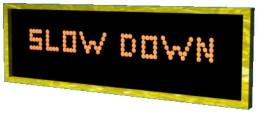
Slow Down - you move too fast

A hypothetical scenario: there's a rock concert coming up featuring twenty top bands, a cannot-afford-to-miss occasion. Tickets cost $200 a piece and it will be a hassle getting to and from, but it will be worth it. So you go. Then you discover they play it at high-speed and it's over in thirty minutes. The night out has cost you heaps and you feel cheated. But, if you consider the big picture, what's to complain about? This is how you live your life, every minute, every day - rush and tear, gabble gabble, skipping from one concept to another in the blink of an eye. Is it any wonder that you get stressed and appreciate so little? When you think about it, modern living is only fast-paced because that's how you make it. And when you are on your death-bed and your past is flashing before you, what do you reckon you'll remember that was of any consequence? Quite possibly not much, because it all happened too fast.
The pattern starts to form perhaps even before we are born. They say that a child in the womb is aware of its environment. Sounds of happiness or conflict in the home, a loud bang, the dog barking, someone shouting at it to stop, all are heard by the child. It doesn't know what these noises mean in terms of personal experience, but it will get a fair idea of whether they are good or bad from their mother's reactions. Here is something they can feel - sudden tension, a buzz of excitement, a skipped heartbeat, fear, anger, all of those emotions they will be confronted by and will have to deal with one day. Before a child has even seen the light of day, the programming has begun, not the least being the pace that it will be expected to keep up with.
If the birth was planned, presumably allowances would have been made for the new arrival, but no matter what the changes to the parents' thinking, the routine they have been following to this point must be disrupted. Very few have the luxury of complete devotion to parental duties and have to fit them in with whatever else is in their normal schedule. The result is often a speeding-up of everything, from preparing meals to shopping, looking after other kids if they have them, plus nappy-changing, feeding the baby, heaps more washing, all these for the stay-at-home parent. Meanwhile, the partner who can still go to work isn't immune, having to take up the slack around the place. It's now a higher gear for both and this is what the child learns from. Soon enough it will be crawling, then walking, hopefully in its own good time, and the examples continue as it is introduced to more of its surroundings. Toys, of course, are totally necessary to keep the child amused and for the teaching of a few basics such as shapes, colours, numbers and letters. Then come those life skills like what and what not to touch, plus the simpler rules of the house. Each child being different, one might expect they would be permitted to progress at a pace guided by individual temperament and mental capacity; unfortunately, many parents see what other children have achieved, in some instances their own offspring, and they expect the new one to be at least as smart, if not smarter. The poor little tacker hasn't even begun kinder, yet Mum and Dad have already signed it up for the race of a lifetime!
And so to school - maths, English, social studies, exams and the graduation ball... Hey, wait a minute! What happened to the formative years leading up to hormones and puberty? Well, you say, we kind-of turned around and they'd gone. That's a pity because the babies have become teenagers who babble unintelligibly at the speed of sound, have next-to-no social skills and are falling behind in most subjects except sex education about which they already know more than their teacher thanks to practical experience. And the sad fact is: they haven't failed themselves - we've simply pushed them too far too fast. They have been driven through childhood like a herd of stampeding cattle. No wonder they are so ill-prepared for what comes next. Not that they'll need our input, seeing as they already know everything there is to know of life. We might beg to differ, but up to now we haven't exactly been shining examples of doing it right; just how to get it over with quickly. As for appreciation - that takes time and we never seem to have any to spare!
In truth, life is over-full and we can only get through everything we deem necessary by rushing. It's as if we need to be somewhere fast, tearing along the highway, glimpsing roadside billboards as we fly past, gaining little from them apart from a vague recollection of a fleeting image and perhaps a few words. Where is this mythical place we are heading towards at break-neck speed? Presumably it will be somewhere in our future; as for its nature, very few can claim to have a clear idea of that; and when they eventually arrive, most won't even know they have. Isn't it about time we quit this lemming-like charge and started to really enjoy our world and all it has to offer?
There are some wonderful experiences to be had if we just slow our pace. Take reading for instance. Once upon a time a book was an essential part of the day, an ideal distraction while sitting in the bus on the way to work, or in bed and winding down before switching off the light. They tell of the best and worst of times, of romance, of magic, of history and the distant future. Readers can live the life of any character in the book as if they were them. Reading is a total experience of other lives, dreams and aspirations, challenges and victories; or it should be. I'm talking actual reading here, each word and syllable, every paragraph, travelling steadily through the story as the author intended when they wrote it. Save speed reading for technical manuals and teaching aids which will give you the basic facts minus any emotion which is irrelevant; but treat a book as you would a movie watched and savoured at normal speed. Then you'll be able to say in all honestly that it was better than the film.
Click this ![]() image to view or print complete article.
image to view or print complete article.
Money Health Focus Popcorn Recipes eBooks About Contact
copyright © 2011-2015 All Rights Reserved